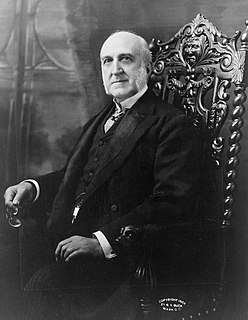A Quote by Chauncey Depew
A witty illustration or an apt story will accomplish more than columns of argument.
Quote Topics
Related Quotes
Comics are not illustration, any more than fiction is copywriting. Illustration is essentially the application of artistic technique or style to suit a commercial or ancillary purpose; not that cartooning can't be this (see any restaurant giveaway comic book or superhero media property as an example), but comics written and produced by a cartoonist sitting alone by him- or herself are not illustrations. They don't illustrate anything at all, they literally tell a story.
The argument for collectivism is simple if false; it is an immediate emotional argument. The argument for individualism is subtle and sophisticated; it is an indirect rational argument. And the emotional faculties are more highly developed in most men than the rational, paradoxically or especially even in those who regard themselves as intellectuals.
If you think your belief is based upon reason, you will support it by argument rather than by persecution, and will abandon it if the argument goes against you. But if your belief is based upon faith, you will realize that argument is useless, and will therefore resort to force either in the form of persecution or by stunting or distorting the minds of the young in what is called 'education.'
History is the art of making an argument about the past by telling a story accountable to evidence. In the writing of history, a story without an argument fades into antiquarianism; an argument without a story risks pedantry. Writing history requires empathy, inquiry, and debate. It requires forswearing condescension, cant, and nostalgia. The past isn’t quaint. Much of it, in fact, is bleak.
If you and I are not having a dialogue, when you're having an argument, the reason the argument happen is because we are not listening to each other. Then, the argument comes in, but if we truly listen instead of hearing, argument will not happen. Then, we'll empathize, and then once the empathy kicks in, you will be much more inclining with my viewpoint and I'll be inclining with your viewpoint, and that's what is missing in organizations.
































